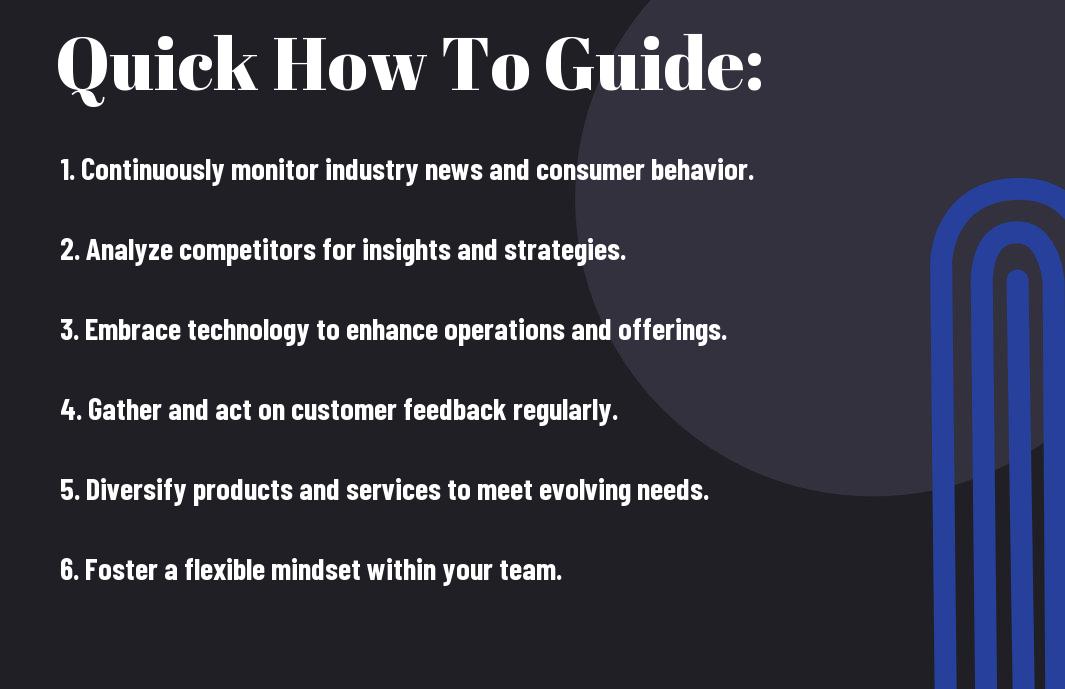
Over time, markets evolve, and staying ahead requires a proactive approach. You need to consistently analyze your industry landscape, adjust your strategies, and remain flexible to thrive amidst changes. In this guide, you will discover practical steps to identify emerging trends, align your business strategies effectively, and enhance your competitive edge. By actively adapting to market dynamics, you can ensure your business not only survives but flourishes in today’s fast-paced environment.

Understanding Market Trends
The ability to identify and understand market trends is imperative for maintaining a competitive edge. By keeping an eye on shifts in demand, technological advancements, and economic changes, you can better position your business to meet consumer needs. When you leverage market data effectively, you can capitalize on emerging opportunities and navigate potential threats.
Identifying Key Market Factors
Even the smallest shifts in consumer preferences can influence your market positioning. Begin by focusing on key factors that affect your industry, including:
- Economic conditions
- Technological advancements
- Competitor strategies
- Regulatory changes
- Social and environmental trends
This approach will allow you to make informed decisions that align with the evolving landscape.
Analyzing Consumer Behavior
One of the most effective ways to adapt to market trends is by analyzing consumer behavior. Observing how your target audience makes purchasing decisions, what influences their preferences, and how they respond to your marketing strategies can provide valuable insights.
Plus, delving into consumer data can help you identify patterns that are critical for product development and marketing. By paying attention to demographic shifts, social media interactions, and feedback through surveys, you can tailor your offerings to meet the changing needs of your customers. This proactive approach ensures that your business remains relevant and responsive to market demands.
Adapting Business Strategies
There’s no doubt that the ability to adapt your business strategies is important for thriving in a dynamic market. By constantly evaluating your approaches and staying informed about emerging trends, you can reposition your business to meet evolving consumer demands. This proactive mindset allows you to identify opportunities and challenges, positioning you ahead of competitors who may be slower to pivot.
Flexibility in Product Development
Flexibility in product development means being open to iterating and refining your offerings in response to market needs. By gathering customer feedback and staying attuned to industry innovations, you can ensure that your products remain relevant and appealing, ultimately enhancing customer satisfaction and loyalty.
Modifying Marketing Approaches
Adapting your marketing approaches is important in responding to shifts in consumer behavior and market dynamics. By experimenting with new channels and messaging strategies, you can reach your target audience more effectively and maintain engagement.
The key to successfully modifying your marketing approaches lies in leveraging data analytics and consumer insights. By analyzing campaign performance and feedback, you can refine your messaging to resonate better with your audience. Additionally, staying informed on digital marketing trends allows you to incorporate innovative tactics, ensuring your brand remains relevant and effective in an ever-evolving landscape.
Leveraging Technology
All businesses today must harness the power of technology to adapt to changing market trends. By leveraging tools and systems that enhance efficiency and provide insights, you can stay ahead of competitors. Embracing new technologies allows you to respond to customer demands more rapidly, optimize your operations, and gain valuable insights into your market landscape.
Utilizing Data Analytics
Even small businesses can benefit tremendously from data analytics. By gathering and analyzing data on customer behavior, buying patterns, and market trends, you can make informed decisions that lead to better strategies. This proactive approach allows you to anticipate shifts in the market, ensuring you remain relevant and competitive.
Embracing Digital Tools
Leveraging digital tools is important for modern business success. Whether it’s using customer relationship management (CRM) systems, project management software, or digital marketing platforms, these tools streamline operations and enhance your ability to connect with your audience effectively.
Utilizing digital tools can transform the way you operate. By implementing CRM systems, you can manage client interactions more efficiently, leading to improved customer service and retention. Project management software keeps your team organized and on track, making collaboration smoother. Additionally, leveraging digital marketing platforms allows for targeted campaigns that can adapt in real-time based on analytics, ensuring your marketing strategies align with current trends and consumer preferences.
Networking and Collaboration
Once again, expanding your network can offer invaluable insights and opportunities to adapt to changing market trends. Networking isn’t just about making connections; it’s about building relationships that foster collaboration and innovation. By engaging with various professionals, you can exchange ideas, share experiences, and access different perspectives that enhance your adaptability in the market.
Building Strategic Partnerships
Partnerships can amplify your reach and resources. By aligning with businesses that complement your strengths, you can create synergies that drive mutual growth. These collaborations can provide access to new markets and additional expertise, allowing you to navigate market shifts more effectively.
Engaging with Industry Experts
To keep up-to-date with market trends, seek out industry experts who can offer insights and forecasts. Connecting with thought leaders can expose you to innovative ideas and practical strategies that may enhance your business adaptability.
For instance, attending webinars, conferences, or industry-specific events where experts speak can be beneficial. Engaging in discussions and asking questions not only enhances your knowledge but also allows you to build rapport with these influential figures. This interaction can lead to mentorship opportunities, access to exclusive information, and potential collaborations that keep you ahead of market changes.
Continuous Learning and Training
Unlike many other industries, staying ahead in today’s fast-paced market requires a commitment to continuous learning and training. You must proactively seek opportunities to upgrade your skills and knowledge to effectively adapt to emerging trends. This dedication not only enhances your expertise but also positions you as a leader in your field, ready to tackle any challenges that arise.
Staying Informed on Trends
Clearly, keeping yourself updated on market trends is necessary for making informed decisions. Regularly consuming industry-related content, participating in webinars, and engaging with thought leaders can provide valuable insights. Additionally, subscribing to relevant newsletters and joining professional groups can help you stay connected with the latest developments, enabling you to anticipate changes and respond effectively.
Investment in Employee Development
On the other hand, investing in employee development is key to maintaining a competitive edge in evolving markets. Providing training programs, workshops, and resources for your team not only enhances their skills but also fosters a culture of growth and innovation.
Trends in employee development indicate that organizations prioritizing continuous training and support experience higher engagement and lower turnover rates. By cultivating a workforce that is equipped to face market shifts, you empower your team to seize opportunities and solve challenges efficiently. Investing in development is not only beneficial for your employees; it directly contributes to your organization’s adaptability and long-term success.
Implementing Feedback Loops
Many successful businesses thrive by embracing feedback loops, which allow you to capture insights directly from your customers. By regularly soliciting opinions and preferences, you can gain valuable perspectives that drive your product improvements and service adjustments. Establishing these loops encourages open communication with your audience and helps you adapt swiftly to changing market dynamics.
Gathering Customer Insights
Gathering customer insights is vital for understanding the needs and expectations of your target audience. Utilize surveys, social media engagement, and direct interviews to collect valuable data. This information will help you fine-tune your offerings, ensuring that they align with what your customers truly value.
Iterative Improvements
Implementing iterative improvements means making continuous enhancements based on the feedback you gather. By analyzing customer insights, you can identify areas that require enhancement and prioritize updates. This flexible approach allows you to quickly adapt your offerings, keeping pace with evolving market trends and customer expectations.
Loops of feedback enable you to make informed decisions and foster a culture of continuous improvement within your organization. By establishing a system for regularly reviewing customer insights, you can prioritize changes that will most positively impact your audience. This not only enhances your products and services but also builds trust with customers, showcasing your commitment to meeting their needs. Ultimately, iterative improvements position you to stay competitive in a rapidly changing market landscape.
Final Words
On the whole, adapting to changing market trends requires a proactive mindset and a willingness to embrace innovation. You should regularly analyze data to understand consumer behavior, invest in ongoing education to enhance your skills, and remain flexible in your strategies. Cultivating strong relationships with industry peers will also keep you informed about emerging trends. By actively engaging with your audience and leveraging technology, you can optimize your approach and position yourself ahead of the competition, ensuring long-term success in an ever-evolving marketplace.
Leave a Reply